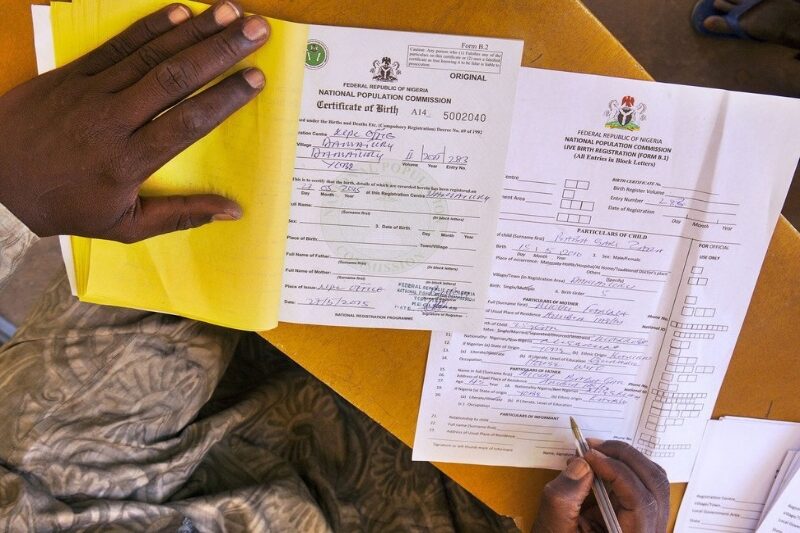Thousands of internally displaced persons (IDPs) in Borno State in the northeast of Nigeria do not have a birth certificate, do not know how to get one and some do not even know why they need one.
There are several reasons for this:
- Many people were never issued birth certificates or, if they were, they had lost them;
- The 14-year-old conflict resulted in millions fleeing from their hometowns, leaving everything – including birth certificates – behind. Being moved from IDP camp to IDP camp did not help;
- Many lost their birth certificates in last year’s damaging floods as they fled from their homes on the banks of overflowing rivers to higher ground.
The UN Refugee Agency said that without a birth certificate, which provides crucial proof of the one’s name, date of birth, place of birth and the identity of a child’s parents, many IDPs lacked any proof of entitlement to a nationality and were therefore left at risk of statelessness.
Addressing low birth registration rates, especially in the case of displaced populations, was important so that they were able to prove their entitlement to citizenship and associated rights, such as the right to stay in the country, it said.
The National Population Commission said at least seven million babies were born each year in Nigeria and more than 60% of births of children under five remained unregistered, leaving many of them at risk of statelessness.
RNI spoke to residents of Mashidimami, an unofficial IDP camp in Borno State’s capital, Maiduguri, where 50% of the more than 200 people living there did not possess a birth certificate.
Yashuwa Bulama Abba, a mother of four, said: “We fled from Dalwa Village during the insurgency. I had collected birth certificates for my children at the Molai hospital. But in our haste to get away from marauding insurgents, I left the certificates behind. Two years ago, representatives from the National Register of Citizens (NRC) visited us in our camp and told us how important birth certificates were. They gave me four certificates, free of charge, for my children.
“Unfortunately, during the floods last year I lost two of the certificates. I thought that I could only get the other two certificates if my children were immunised. But, when I went to the clinic, healthcare workers said that was not a condition and that anyone could get birth certificates without immunisation.”
Yafalmata Chari, a mother of nine, said: “Until I spoke to you, I was not aware that children had to have birth certificates. I live in the bush and I have always given birth at home. Now that I know, I want to get birth certificates for my children. But I do not know the process. I don’t know where to go or how to get them.”
Fannami Amadu, a leader of Mashidimami camp, said: “Most of the residents in the camp are ignorant. When members of the NRC came to our camp about two years ago, they gave us birth certificates. But, since then, there have been new arrivals. Some residents lost their birth certificates in the floods. Others were careless and did not collect their birth certificates at the time the NRC representatives were here. Now most residents do not know where to go to get new certificates issued.”
Of the more than 100 people living at Modu Kan Bolah, an unofficial camp in Damboa Road, Maiduguri, at least half of the residents said that they used to have birth certificates but they had lost them in the floods.
Falamata Barma Kashim said : “I got six birth certificates for my children when the NRC representatives were at the house of the head of the ward in the Silimuri community near our camp.
“But I know of many people who lost their birth certificates in the floods when we were forced to move from one camp to another. They still have not been able to access another.”
Abdul Rahman Ibrahim, who works in the immunisation unit at the new GRA Clinic in Maiduguri, said: “It is greatly important for people to have a birth certificate. You have to know your age; you need it to enrol your children at school; and you need it to prove your nationality.”
He said people could get their birth certificates at any clinic near to where they lived.
“It is free. Some clinics will laminate them at a cost of ₦100, which helps to keep them safe and waterproof so they won’t be destroyed by flooding. Every IDP – indeed everyone – should have a birth certificate and, as long as they are Nigerian, all they need to do is go to the nearest clinic, give details and collect them as soon as they’re ready. It’s not a difficult process.”
Zainab Alhaji Ali






